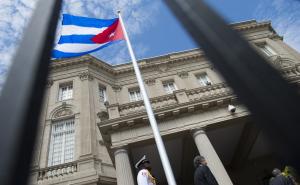Jan. 9 (UPI) — A senior U.S. official told senators at a Senate hearing Tuesday that Secretary of State Rex Tillerson will open a high-level investigation into unexplained “sonic attacks” that physically affected diplomats at the embassy in Cuba last year.
Francisco Palmieri, the State Department’s acting assistant secretary of state for Western Hemisphere Affairs, told a Senate Foreign Relations subcommittee that Tillerson will convene an Accountability Review Board to evaluate cases involving diplomatic personnel or facilities.
“I would also like to emphasize up front that the investigation into these health attacks is ongoing,” Palmieri told the subcommittee.
Sen. Marco Rubio, R-Fla., who conducted Tuesday’s hearing, said the board should have been convened sooner because at least one person suffered serious injuries.
“According to the law, in any case of serious injury related to a U.S. government mission abroad, the secretary of state shall a convene an accountability review board,” Rubio said.
Palmieri said the attacks originally were classified as “harassment.”
“U.S officials approached the Cuban government in mid-February to demand it meet its obligation under the Vienna convention to protect our personnel. The Cubans denied involvement, offered their cooperation, and opened their own investigation,” Palmieri testified.
“Among the descriptions, they complained of, a high pitch beam of sound, incapacitating sound, baffling sensation, akin to driving with windows partially open in a car, or just intense pressure in one ear.”
Rubio, whose parents were born in Cuba, represents a state just 100 miles north of the island.
The State Department has confirmed 24 cases of workers in Havana being affected by the purported “attacks.” The diplomats said when they left rooms in the embassy, the symptoms and sounds immediately stopped, indicating some type of sonic weapon may have been used.
The diplomats described concussion-like symptoms, including hearing loss, dizziness, balance problems, visual complaints, headaches, fatigue, cognitive issues and difficulty sleeping, U.S. officials said.
FBI agents investigated the incidents in Cuba but so far have not determined what caused the illnesses.
Sen. Bob Menendez, D-N.J., on Tuesday called the U.S. response inadequate, but centered his attacks on Cuba.
“If senior Cuban officials did not directly order these attacks, they must’ve been aware or given tacit approval to foreign agents to operate in Cuba,” Menendez said.
Sen. Flake, R-Ariz., disputed calling it an “attack.”
“There are some people with symptoms happening that are unexplained,” Flake, R-Ariz., told CNN last week while visiting the island. “The Cubans bristle at the word ‘attack.’ I think they are justified at doing so. The FBI has said there is no evidence of an attack. We shouldn’t be using that word.”
Flake said classified briefings support Cuba’s denials of involvement in the incidents.
Seventeen Cuban diplomats were expelled from the United States due to the events.

COMMENTS
Please let us know if you're having issues with commenting.